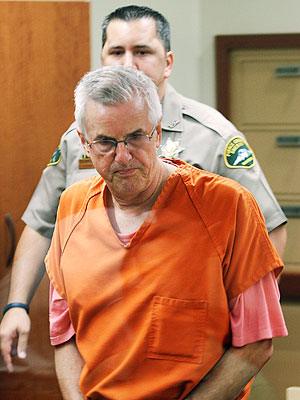TOKYO (Reuters) - Asian shares touched fresh 16-month highs on Friday following modest overnight gains in global equities as investors watched progress in U.S. budget talks with expectations for an eventual deal and awaited U.S. nonfarm payrolls data later in the day.
The euro hovered near a one-week low against the dollar, having fallen after the European Central Bank painted a bleak outlook for the euro zone and discussed cutting interest rates at its policy meeting on Thursday when it kept rates steady.
Recent indicators suggesting stabilizing growth in China, the world's second-largest, economy also helped improve sentiment, although the Asian Development Bank slightly lowered its 2012 and 2013 growth estimates for developing Asia on Friday as frail global demand drags on the region.
Buoyed by strong domestic demand, developing Asian economies have shown relatively more resilience compared with developed and more export-reliant economies such as Japan and south Korea.
MSCI's broadest index of Asia-Pacific shares outside Japan <.miapj0000pus> rose 0.6 percent, and was set for its third-straight weekly gain with a 1.4 percent advance. The index has gained about 17 percent year-to-date, compared to a loss of nearly 18 percent last year.
South and Southeast Asian bourses have outperformed, with a 32 percent year-to-date surge in the Philippines <.psi>, a nearly 31 percent gain in Thailand <.seti>, Indian shares <.bsesn> rising 26 percent and Indonesia <.jkse> up 12 percent to date.
Hong Kong shares <.hsi> were up 0.5 percent to a 16-month high and risen 21 percent so far this year, despite facing bouts of pressure from sputtering mainland Chinese markets.
South Korean shares <.ks11> were up 0.5 percent and Australian shares <.axjo> jumped 0.9 percent to its highest in nearly seven weeks, as top miners were supported by rebounding iron ore prices and banks recovered from losses the previous day.
"One of the reasons for the gains is better news we've seen from China and expectations the economy there has stabilized and growth has improved modestly," said Michael McCarthy, chief market strategist at CMC Markets.
Japan's Nikkei stock average <.n225> inched up 0.2 percent. <.t/>
U.S. stocks advanced modestly while the FTSEurofirst 300 index <.fteu3> of top European shares hit an 18-month closing high on Thursday.
As superstorm Sandy disrupted U.S. economic activity, nonfarm payrolls in November are expected to have increased only 93,000, compared to October's 171,000 job gain, a Reuters survey of economists showed. The unemployment rate is seen holding steady at 7.9 percent.
"A soft number should reinforce the case for the Fed doves ahead of next week's FOMC meeting where QE is likely to be increased in order to at least offset the expiration of Operation Twist. Hence a soft report should hurt USD and vice versa," Sean Callow, senior currency strategist at Westpac bank in Sydney, said in a note.
At its December 11-12 meeting, the Federal Reserve is expected to announce a new round of Treasury bond purchases to reinforce quantitative easing, replacing the expiring programme called Operation Twist, under which it bought $45 billion of longer-dated bonds a month while selling its shorter-date holdings.
The dollar traded at 82.47 yen, sticking close to a 7-1/2-month high of 82.84 hit on November 22.
With little to show after a month of posturing, the White House and Republicans in Congress dropped hints on Thursday that they had resumed low-level private talks on breaking the stalemate over the "fiscal cliff" but refused to divulge details.
Markets have been keeping up hope that Washington would eventually avert some $600 billion of tax hikes and spending cuts scheduled to start in January. Economists have warned that failure by Congress to reach an agreement on deficit reduction could tip the U.S. economy back into recession, further weighing on the fragile global economy.
"The main board is extending its upward trend that began in mid-November on hopes for a positive conclusion to the U.S. 'fiscal cliff' and economic growth policies from China," said Park Hae-sung, an analyst at LIG Investment & Securities.
Global rates: http://link.reuters.com/xyb96s
U.S. fiscal cliff: http://link.reuters.com/dut83t
Asset returns in 2012: http://link.reuters.com/nyw85s
^^^^^^^^^^^^^^^^^^^^^^^^^^^^^^^^^^^^^^^^^^^^^^^^^^^^^^^^^^^>
EURO ON DEFENSIVE
The euro steadied at around $1.2968, after falling nearly 1 percent to $1.2950 on Thursday in its biggest one-day loss in a month, and retreating from a seven-week peak of $1.3127 set mid-week.
ECB President Mario Draghi said on Thursday policymakers had held a wide discussion on interest rates, including negative deposit rates, leaving the door open to a possible cut in borrowing costs next year.
Creating negative deposit rates means effectively charging depositors rather than paying them interest, with an aim of forcing banks to put their money to work elsewhere.
The ECB's new staff also projected gross domestic product next year could range from a contraction of 0.9 percent to growth of just 0.3 percent, suggesting contraction is far more likely than not. It forecast inflation of 1.1 percent to 2.1 percent next year.
"It is unusual that a negative growth projection for the next year is offered before the end of the current year, but with such a view, markets are naturally pricing in a interest rate cut," said Daisuke Karakama, market economist for Mizuho Corporate Bank in Tokyo.
He expected the euro to remain vulnerable with the risk of falling back to $1.2 at some point, but the single currency appeared to be supported currently by year-end repatriation flows.
U.S. crude futures inched up 0.3 percent to $86.53 a barrel and Brent rose 0.2 percent to $107.27.
(Additional reporting by Joyce Lee in Seoul and Maggie Lu Yueyang; Editing by Kim Coghill)











